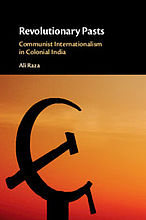Revolutionary Pasts
Communist Internationalism in Colonial India
Cambridge University Press, Cambridge, 2020
280 S.
In this engaging and innovative history of the communist movement in colonial India, Ali Raza reveals the lives, geographies, and anti-colonial struggles of Indian revolutionaries and how they sought to remake the world. Driven by the utopian visions of Communist Internationalism, Indian revolutionaries yearned and struggled for a global upheaval that would overthrow European imperialisms and radically transform India and the world. In an age marked by political upheavals, intellectual ferment, collapsing empires, and global conflicts, Indian revolutionaries stood alongside countless others in the colonized world and beyond in their desire to usher in a future liberated from colonialism and capitalism. Drawing from a wealth of archival materials, Raza demonstrates how Communist Internationalism was a crucial project in the struggle for national liberation and inaugurates a new approach to the global history of communism and decolonization.
1_ Revolutionary Pasts, https://doi.org/10.1017/9781108693875.001
The introductory chapter, ‘Revolutionary Pasts’ , begins with an overview of twentieth-century schemes aimed at remaking the world order, and specifically, the project of Communist Internationalism. I situate my work within recent scholarship on twentieth-century internationalisms and transnational approaches within South Asian historiography. In doing so, I explore the ways in which revolutionary pasts suggest new methodological and conceptual approaches in transnational history writing. The second section is a detailed meditation on the archives through which the Left speaks. At stake is a broader methodological question of how revolutionary pasts can be traced through the archival grain. These methodological questions in turn invite a reassessment of how the Left has been written about. They also suggest new approaches in excavating its intellectual, social, and political history. Lastly, I provide an overview of the following chapters and how they are threaded together through the central arguments of the book.
